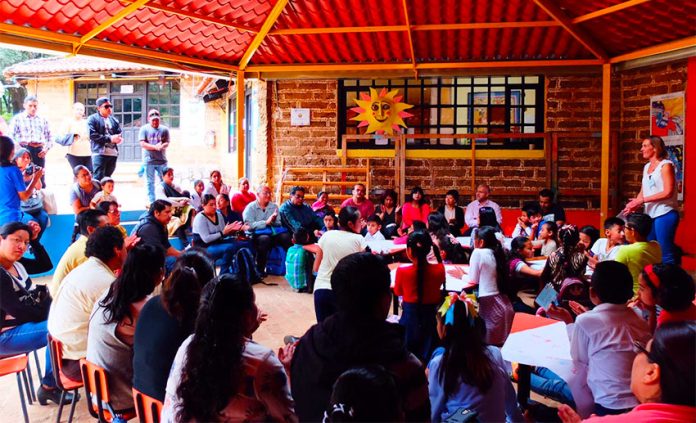With only one state at the green level on Mexico’s coronavirus stoplight risk map, there appears to be no clear end in sight to Mexico’s approximately 33 million schoolchildren learning at home virtually via the internet, television, and radio.
However, a small education and vocational training program working with elementary school children in San Cristóbal de las Casas, Chiapas, has brought its students back together this fall for in-person classes, and staff say they see the impact of months of isolation on their students’ emotional well-being.
“They missed being together and working together, and shared with us that they had felt sad during the past months,” said Eleni Asimakopoulos, strategic director for Mundo de Talentos, a nonprofit program that offers children aged 10–13 in San Cristóbal a curriculum to prepare them academically and socioemotionally for higher education and fulfilling careers.
Founded in 2017, Mundo de Talentos educates children on a wide range of topics, including journalism, medicine, law, the arts, science, and entrepreneurship but also presentation, debate, collaboration, and conflict resolution skills. Since returning to hybrid classes in September, students meet on Saturdays with new safety protocols for the in-person classes and also take part in classes on WhatsApp video.
Before September, it had been using WhatsApp video exclusively since Mexico closed its schools in March.
The program is an offshoot of an academic enrichment and careers program for low-income students in the Netherlands, The IMC Weekendschool, founded in 1998. The San Cristóbal program is funded by donations from European and Mexican companies and maintains ties with the Dutch organization. Admission to the San Cristóbal program is free. The program expects to have its first class of graduates in April 2021.
Chiapas is a challenging environment for children to succeed in higher-level careers. According to Mexico’s statistics agency, Inegi, the state has the lowest percentage of school attendance for children 6–14 years old, with 7% not receiving any formal education. On average, residents over 15 have only about seven years of education, equivalent to little more than the first year of middle school. Statewide, more than 80,000 children aged 5–14 work.
In San Cristóbal, according to the children’s rights organization Melel Xojobal, 2,594 children citywide either work or accompany their families to work activities.
“Although the economic situation of families is a major cause of school dropout, another important reason why young people do not study or drop out of school is that they have not received any appropriate guidance on what future options and opportunities exist,” says Asimakopoulos. “We want to focus on supporting children from public schools in San Cristóbal to discover who they want to be.”
Mexico News Daily
